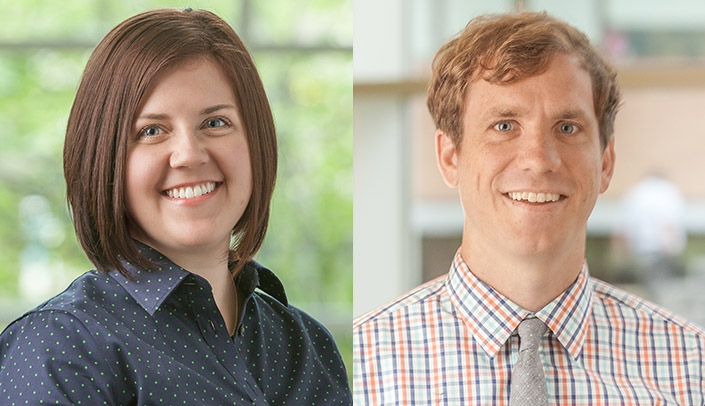Austin Barry is now in his fourth week of clinical rotations.
Two months after he expected to be.
Barry, a third year medical student, is part of a group of UNMC medical students that recently began their clinical rotations following a hiatus caused by the COVID-19 pandemic. He is now at the VA Hospital on the inpatient service.
“The whole process was surreal,” he said. “We were all geared up to go back in April. We were in the middle of our acute care block, preparing us for our first days on rotation – and they sent us an email one night telling us ‘Don’t come back in.'”
During those two months — while med students were taking online courses in infectious diseases and professional development — clerkship directors such as Laura Cudzilo, MD, assistant professor of obstetrics/gynecology, were working with furiously with college and university leaders to ensure that when medical students did return, it would be to a safe and educationally valuable environment.
“There was a lot of planning and preparation, for many different scenarios,” Dr. Cudzilo said. “There was a lot of feedback from other clerkship directors across the country, as well, on what different institutions were doing.”
Now that the students are in rotation, the college faculty is excited to have them back, she said.
“There’s something about having the students back and being able to be a part of their learning that’s energizing,” she said. “Especially when clinical medicine and direct patient care is still something that is so new to them, just being able to be around them as they have these clinical experiences is invigorating for a faculty member. It reminds me of how incredible our job is and what a privilege it is.”
The faculty aren’t the only ones excited.
“It’s nice to be doing things again, to really feel like I’m engaged with my education again,” Barry said. “The application of what we’ve learned makes it a lot more exciting and intriguing.”
Although she was disappointed that rotations had to be delayed, third-year student Keely Reidelberger said she appreciated the way UNMC responded to the COVID-19 crisis.
“I’m glad we had some productive things to do,” said Reidelberger, who is in the OB/GYN clerkship now. “The time we spent in quarantine with the virtual courses certainly was mentally taxing, and it’s been so rewarding to be back in clerkships. I feel very fortunate to be here and to be back.”
Michael Smith, MD, a facilitator for the online classes, said that July is always a special time from an educational standpoint, because of the start of the new intern class, and the med students coming back at the same time made it especially rewarding.
“If anything, starting your rotations is more than a feeling of excitement — it’s nervousness mixed with excitement mixed with a whole host of high-level emotions. And those feelings were even higher this year, because the students have been away since March and everything has been remote.
“This is the ultimate new environment for them, having gone from coursework to online coursework to taking care of patients. I’d say things were heightened in a positive way.
Dr. Smith said he also noticed a change in the two med students he’s been working with since rotations began, perhaps due to their experiences during the pandemic. As part of the infectious diseases virtual course, all medical students took part in some form a community outreach.
“The students seem more connected to the humanitarian approach to medicine, well beyond what would be expected for starting their clinical rotations,” he said. “It could be that those two were unique people, but there was a deeper care of the person that was beyond what I would expect for July of a first clinical rotation.”
“You can do a lot of virtual things, but there’s something to be said for having hands-on experiences,” Dr. Cudzilo said. “We’re doing everything in our power while the students are on campus to be able to safely offer the experiences of our clerkship, being creative with the restrictions that COVID has imposed, but really trying to get them all of the experiences they’d have under normal circumstances.”
“Whatever we can do to have the students be a part of patient care, it only benefits the patients, as well as the students and other members of our team,” Dr. Smith said.
With COVID-19’s volatility still providing an X-factor, everyone said they hoped students would be able to remain in rotation. But both Barry and Reidelberger praised the college’s response to the challenges the pandemic posed.
“In the short time frame, the university did a good job of putting something together that really worked for the students and was worth doing,” Barry said. “But it is nice to be back out there, doing things and feeling like you’re on track, building the medical knowledge that is going to make you a highly functioning doctor one day.”
“There are still a lot of unknowns, but I appreciate the way UNMC has tackled this problem so far,” Reidelberger said. “I trust that if this problem persists or if the situation changes, they’ll be mindful of what students need.”
